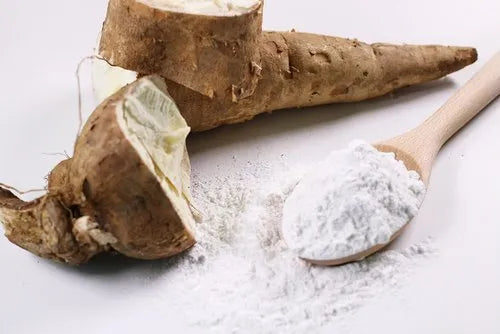Ingredients & Science - Plant Protein
1. Pea Protein Isolate
What is Pea Protein Isolate ?
Pea protein is a plant-based protein derived from yellow peas, also known as Pisum sativum. It is extracted from dried yellow peas through a process that involves grinding the peas into a fine powder and removing the starch and fibre, leaving behind a concentrated protein powder.
What is the difference between pea concentrate and pea isolate?
Pea protein isolates typically contain upwards of 80% protein. This is why they are used in products where protein levels are key.
Pea Protein Concentrate retains more of the carbohydrates, fats, and fibre. As a result, pea protein concentrates are typically 50-60%.
We use pure Pea Protein Isolate 80% in our product.
We also use brown rice protein isolate to complement pea protein and make a complete amino acid profile.
Protein: The Most Important Building Blocks of the Body
- Building and repairing: Protein helps the body repair cells and make new ones, and is important for growth and development. It also helps build and repair muscles and bones.
- Structural support: Proteins are a major structural component of cells, and provide structure and support for the body.
- Chemical reactions: Proteins catalyze almost all chemical reactions in the body.
- Gene expression: Proteins regulate gene expression.
- Immune system: Proteins regulate the immune system.
- Hormones and enzymes: The body uses amino acids to make hormones and enzymes.
- Energy source: Protein can be used as an energy source.
- pH balance: Proteins help maintain the proper pH balance in the blood.
- Messenger proteins: Some types of proteins transmit signals to coordinate biological processes between different cells, tissues, and organs.
- Transport and storage: Some proteins bind and carry atoms and small molecules within cells and throughout the body.
Is Pea Protein as effective as Whey for Muscle gain?
Study: Pea proteins oral supplementation promotes muscle thickness gains during resistance training: a double-blind, randomized, Placebo-controlled clinical trial vs. Whey protein
Conclusion: “…thickness increases were significantly different between groups (+20.2 for Pea, +15.6% for Whey…)
”Pea Protein actually increased muscle 30% more than whey!
"But Plant Proteins are incomplete protein..." FALSE!
- All plant foods contain all 20 amino acids, including the 9 indispensable amino acids."
- 2020 Study: Association Between Plant and Animal Protein Intake and Overall and Cause-Specific Mortality Link https://doi.org/10.1001/jamainternmed.2020.2790(link opens in new tab/window)(link opens in new tab/window)
16yrs, 416,104 men and women in the US “Replacement of 3% energy from animal protein with plant protein was inversely associated with overall mortality (risk decreased 10% in both men and women) and cardiovascular disease mortality (11% lower risk in men and 12% lower risk in women). In particular, the lower overall mortality was attributable primarily to substitution of plant protein for egg protein (24% lower risk in men and 21% lower risk in women) and red meat protein (13% lower risk in men and 15% lower risk in women).”
“Conclusions and relevance: In this large prospective cohort, higher plant protein intake was associated with small reductions in risk of overall and cardiovascular disease mortality. Our findings provide evidence that dietary modification in choice of protein sources may influence health and longevity.”
2. Tapioca starch
Gluten free, gut friendly. Also referred to as the humble 'sabudana' commonly eaten during fasting!
The use of tapioca starch pregel comes with a plethora of benefits.
It is free from genetically modified organisms (GMOs), pesticides, and other harmful chemicals. It is also gluten-free and suitable for individuals with celiac disease.
Renewtra is the first to feature this ingredient in its protein powder. It’s one of the things that makes this product so innovative compared to others you might find on the shelf. You heard it here first.
So give yourself permission to eat this not-so-naughty carb!
Advantages
- It is considered a natural and clean-label ingredient, as it is derived from cassava, a plant-based source.
- Both are naturally gluten-free, making them suitable for individuals with celiac disease or gluten sensitivities.
- Tapioca starch is generally considered non-allergenic, making it a suitable option for people with food allergies or sensitivities.
- It is easy to digest, making it a good choice for those with digestive issues.

3. Postbiotics
The secret to enhance Protein Absorption!
Adding postbiotic to protein enhances high quality protein absorption
What are postbiotics?
Postbiotics are the extracted essence of probiotics that are heat stable and resistant to gastric environment. Introducing exclusive multi-strain fermented postbiotics for digestive and immune support.
Postbiotics can be more effective than probiotics, as they don’t require prebiotic fibers to be present, and they can help when people cannot tolerate eating many fibers due to SIBO and other food sensitivities. In addition, some people don’t tolerate live probiotics due to significant dysbiosis of the gut, so postbiotics can be more effective with less side effects
Lab Reports
Each and every batch of our plant protein is lab tested.

